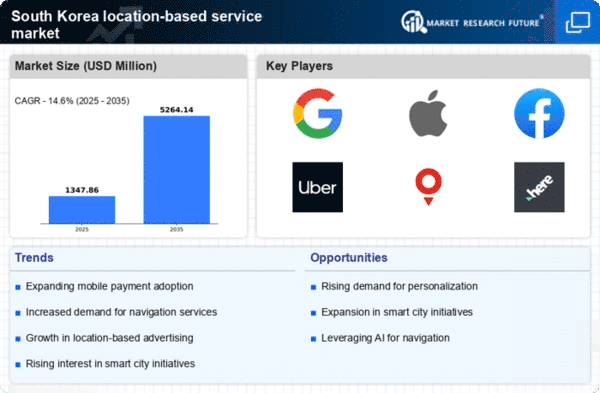Rising Smartphone Penetration
The increasing penetration of smartphones in South Korea is a pivotal driver for the location based-service market. As of 2025, smartphone ownership in the country is estimated to exceed 95%, facilitating widespread access to location-based applications. This high level of smartphone usage enables consumers to utilize various services such as navigation, food delivery, and ride-hailing, all of which rely heavily on location data. The convenience offered by these services is likely to enhance user engagement and drive market growth. Furthermore, the integration of advanced GPS technology in smartphones allows for more accurate location tracking, which is essential for the effective functioning of location based-services. Consequently, the rising smartphone penetration is expected to significantly contribute to the expansion of the location based-service market in South Korea.
Advancements in Location Technologies
Technological advancements in location services, such as GPS, Wi-Fi positioning, and Bluetooth beacons, are driving the location based-service market in South Korea. These innovations enhance the accuracy and reliability of location data, which is essential for various applications, including navigation, marketing, and asset tracking. The proliferation of Internet of Things (IoT) devices also contributes to this trend, as these devices often utilize location data to provide context-aware services. For instance, retail businesses are increasingly adopting location-based marketing strategies to target consumers with personalized offers based on their proximity to stores. As these technologies continue to evolve, they are likely to create new opportunities and applications within the location based-service market.
E-commerce Growth and Delivery Services
The burgeoning e-commerce sector in South Korea is a significant driver for the location based-service market. With online retail sales projected to reach approximately $100 billion by 2025, the demand for efficient delivery services is paramount. Location based-services play a vital role in optimizing logistics and enhancing customer experience in e-commerce. Companies are increasingly leveraging real-time location tracking to provide accurate delivery estimates and improve operational efficiency. This trend is particularly evident in the food delivery segment, where services utilize location data to ensure timely deliveries. As e-commerce continues to expand, the reliance on location based-services is expected to grow, further propelling the market in South Korea.
Urbanization and Smart City Initiatives
The rapid urbanization in South Korea, coupled with government-led smart city initiatives, serves as a crucial driver for the location based-service market. As urban areas continue to grow, the demand for efficient transportation, public services, and infrastructure management increases. The South Korean government has invested heavily in smart city projects, aiming to enhance urban living through technology. These initiatives often incorporate location based-services to optimize traffic management, public safety, and resource allocation. For instance, the implementation of smart traffic systems that utilize real-time location data can reduce congestion and improve travel times. As urbanization progresses, the The market is likely to see substantial growth, driven by the need for innovative solutions to urban challenges.
Consumer Demand for Personalized Experiences
The growing consumer demand for personalized experiences is a notable driver for the location based-service market. In South Korea, consumers increasingly expect services tailored to their preferences and behaviors. Location based-services enable businesses to deliver personalized content, recommendations, and promotions based on users' geographic locations. This trend is particularly evident in sectors such as retail and hospitality, where businesses utilize location data to enhance customer engagement. For example, retailers may send targeted offers to customers when they are near a store, thereby increasing foot traffic and sales. As consumers continue to seek personalized interactions, the location based-service market is likely to expand, driven by the need for businesses to adapt to these evolving expectations.
















